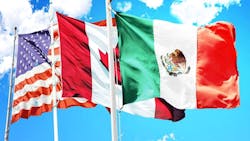The ministers leading NAFTA negotiations are set to wrap up the latest round of high-level talks after Canada and Mexico rejected what they see as hardline proposals by the U.S.
U.S. Trade Representative Robert Lighthizer, Mexican Economy Minister Ildefonso Guajardo and Canadian Foreign Minister Chrystia Freeland are meeting in Washington on Tuesday as battle lines form around contentious U.S. proposals to revamp the North American Free Trade Agreement. They will speak at a press conference together in the afternoon at the end of the fourth round of talks.
Mexico and Canada have repeatedly and publicly rejected the U.S. demands on dairy, autos, dispute panels, government procurement and a sunset clause. Officials familiar with the discussions describe two tracks to the negotiations -- an impasse on a few of the most contentious proposals, and progress being made on updating the pact in other areas.
Canada on Oct. 16 flatly rejected the most recent proposal to dismantle its system of quotas and trade barriers for dairy. Mexico is expected to host the fifth round of talks in early November.
President Donald Trump has called NAFTA a disaster and repeatedly threatened to withdraw the U.S. from the agreement, a step the White House can set into motion by giving six-months’ notice to its trading partners.
At stake is the $1.2 trillion in annual trade between the three countries, as well as the business models of companies such as Ford Motor Co. and General Motors Co. that have adapted their supply chains to take advantage of the trade zone.
Tense Tone
The increasingly tense tone of talks has fueled speculation that Trump will make good on threats and walk away. Declines in the Mexican and Canadian currencies are among the biggest of major world currencies in the past month on concerns that an end to NAFTA could crimp economic growth.
While some investors see the risk of a collapse of talks as rising, the likely outcome remains that the three countries will eventually reach a deal, said Mark Zandi, chief economist at Moody’s Analytics Inc.
“It’s a lot of bluster. They’ll come up with a tweak and declare victory,” Zandi. “At the end of the day, Trump’s a businessman, and he’s got to be listening to business people who are telling him it’s a bad idea” to pull out of the deal.
By Josh Wingrove, Andrew Mayeda and Eric Martin
About the Author
Bloomberg
Licensed content from Bloomberg, copyright 2016.
